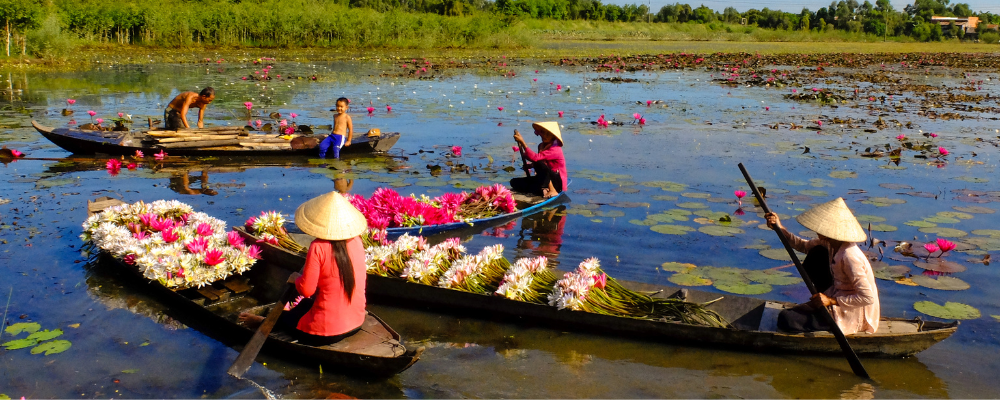Originally published in Centre on Asia and Globalisation Lee Kuan Yew School of Public Policy’s newsletter
Guest Column by Pianporn Deetes is Regional Campaigns Director, Southeast Asia Program at International Rivers
Whatever the geopolitics of hydropower brings to the Mekong River, the people living alongside it must have a greater say in its future development.
In times of geopolitical uncertainty, will new configurations of power bring meaningful changes to the Mekong River’s management and the local communities who depend on it? The Mekong River itself may provide an answer as it has started to protest, showing signs that it may be reaching an ecological tipping point.
And yet, key decisions over the river are hardly driven by the local communities and their concerns, even if they rely on the multiple social, economic, and cultural benefits from the river. Instead, communities are expected to assume the costs of development “externalities” that lead to marginalisation and increasing inequality, while vested interests profit.
For the past two decades, I have worked with community-based organisations and networks within and beyond Thailand to advocate for a more sustainable and socially-just management of the Mekong River basin. During this period, I witnessed how local communities have struggled to have their voices heard and their rights recognized by those in positions of power and privilege, whether within their own countries, across the borders, or beyond the region.
There is no clear sign yet that recent contending geopolitical interests will fundamentally change this problem. After all, the region is all too familiar with powerful neighbours and periods of geopolitical change.
Historically, various kingdoms and cities in the region were tributary states of China. During the reign of King Rama IV, foreign relations were configured to benefit Western countries in exchange for Thailand’s independence. Indeed, the French were the first to place strategic importance on the Mekong River as a potential alternative trade route.
But in recent decades, the tide is turning yet again, and great power politics has returned. Chinese influence has steadily grown in the Mekong alongside the rapid development of Southwestern China. The Thai government, for example, had initially acquiesced to a Chinese-led project to blast rapids on the river that would allow large cargo ships to carry goods from Yunnan to Thailand, Laos, and the rest of Southeast Asia, despite the potential environmental damage. It was only after strong opposition was raised by local environmental groups and communities that Bangkok was forced to scrap the project.
Chinese capital also flowed into a range of resource development projects, including hydropower dams on the Mekong River and its tributaries, as well as land-based investments in minerals, timber, rubber, and other commodities to be exported back to China. Beijing has also financed urban developments, industrial parks, and infrastructure projects, including special economic zones in the Golden Triangle, Sihanoukville, and Si Phan Don in Southern Laos.
Beijing has often backed Chinese investors in their dealings with their economically poorer neighbours. As leaders of recipient countries view these investments as critical to their political and economic goals, they have been happy to bestow privileges upon Chinese investors, including tax subsidies, business-friendly policies, cheap access to land and resources, and even project-based allowances for Chinese employees.
Regional leaders are also comfortable with China’s stated policy of non-interference in development cooperation. This has enabled them to circumvent multilateral bank loans that often come with strong environmental and social safeguards and preconditions. China has also shielded regional authoritarian governments from international pressure. China has further deepened its ties and influence through multilateral mechanisms, such as the Lancang Mekong Cooperation.
Similarly, the US has stepped up its regional engagement, including through the Mekong-US Partnership, which expanded the scope of transboundary challenges to include water and natural resource management. The Partnership has funded various organisations and initiatives to improve the transparency and management of the Mekong. Some of these are seen as attempts to curb China’s influence and have contributed to the increased politicisation of transboundary water governance in the area.
Given these trends, one would think that communities whose livelihoods are dependent on the Mekong River are living in a geopolitical battlefield between China and the US. While the local villagers do not necessarily feel that way, there are serious questions regarding the extent to which great power politics increase or reduce the spaces and opportunities for local communities to have their voices heard and their priorities realised.
For local communities whose lives are inextricably intertwined with the Mekong, regional governments, developers, and other actors should address the widespread negative effects of existing dams that have resulted in the destruction of resources on which their lives, livelihoods and cultures depend. Local communities want the large new dams in the pipeline to be cancelled, and for governments to recognise and respect their rights.
Ultimately, these communities want a greater say in shaping decisions about the river and their own futures. So far, it is unclear whether China and the Lower Mekong governments will be more inclusive of societal voices in addressing transboundary problems caused by existing dams. Nor is it clear if the US is genuinely committed towards providing more space for riparian community voices and engaging Mekong country leaders, including China, to collectively address the ecological crisis.
The fundamental problem is that decisions on the development and management of the Mekong River Basin have been geared towards the region’s political and business elites. Prevailing political economies and institutions of governance continue to marginalise local communities and deny their participation in decisions that would affect their lives. Whatever power configurations emerge out of the current geopolitical uncertainty, what we need is for the people living along the Mekong to have a much greater say in shaping its future.
Featured image: Wikimedia Commons/Gunawan Kartapranata

